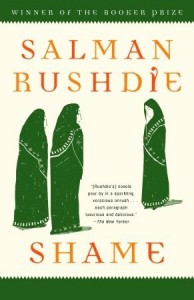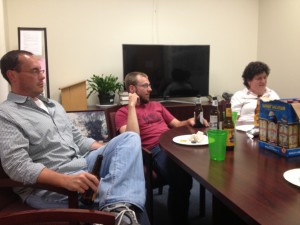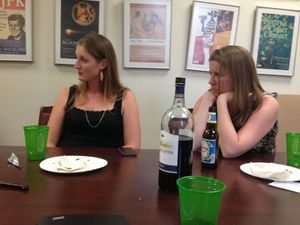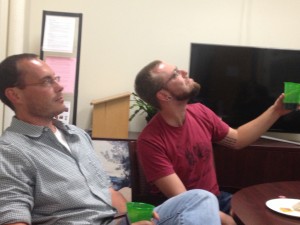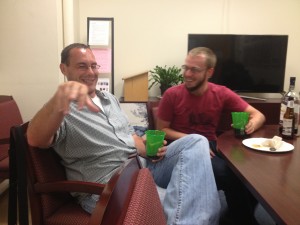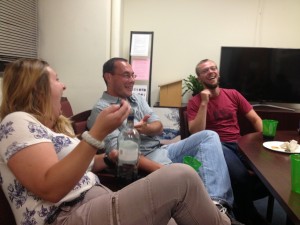EnCore book club members met this month to discuss Salman Rushdie’s novel Shame (click on the link to read the Goodreads summary).
The discussion got off to a slow start, considering many members attending had either not read the book, or had not finished it. Such a situation has never deterred book club attendees, and several discussion points soon arose:
Political Allusions in Rushdie’s Novel
“A wall I hit: Is Rushdie giving me a history lesson of Pakistan?”
A point of interest (and alienation) for many was that the novel is based on real historical events and people from 20th century Pakistan, portrayed in the style of magical realism. Two central figures are Zulfikar Ali Bhutto (fictionalized as Iskander Harappa) and General Muhammad Zia-ul-Haq (fictionalized as General Raza Hyder). While some argued that some basic knowledge of the period was sufficient to enjoy the book, others disagreed.
A constant comparison throughout the discussion was to another Rushdie work, Midnight’s Children. Though a somewhat longer work that delves deeply into the political history of India’s independence, many argued that its story was more captivating, while continuing to display Rushdie’s idiosyncratic sentence structure, playful language twists, and childlike perspectives.
There was disagreement as to whether Rushdie’s interrupting omniscient narrator in Shame was as effective in his self-awareness. While some were impacted by the imagery of a struggling writer trying to pull different aspects of his story together, different elements that wriggled and refused to sit still, like naughty children, others agreed that Rushdie “got a bit precious with his sections on meta-narrative.”
Nevertheless, someone pointed out that like Midnight’s Children, Shame often portrays that from “A child’s point of view: adults suck. And women–REALLY don’t want to be one.”
Shame and Morality
“Shame in the novel is a fizzy drink from a vending machine; when the cup is removed, it spills everywhere.”
It affects everything, and it makes a real mess. But does it instigate change or conformity?
Does shame shape the personality of the characters, rather than their actions? It was pointed out that shame is actually overwhelmingly lacking in the novel, in the sense that it does not exist as any deterrent to violence or evil. Rushdie’s potential point: Why does no one stop? Have we no decency? Will the slaughters ever cease? Considering the recent release of the documentary The Act of Killing (2013), global prospects are bleak.
As we always have done with other Core works, we discussed human nature, more specifically “the feelings we get when we do bad things,” and its visible signal: the blush. It varies by person, and by culture: “What turns my face red wouldn’t necessarily turn your face red.”
Can we even count on culture to tell us what’s right, and what’s wrong? This discussion echoed our last meeting, when we discussed the ethical dilemmas surrounding the study of post-colonialism.
The discussion raised more questions than conclusions: “If you take it away from religion and government, morality gets much more complicated and layered.”
“We’ve made up the distinction between hurting somebody and, you know, getting caught masturbating. The scary thing is that it’s an arbitrary line we set.”
Bottom line: What are we to make of Rushdie’s story? Is it even his story to tell? As someone wisely noted, “The position of the impassioned outsider, where you don’t necessarily have the right to lay claim to it, is a difficult place to be.”
Other Memorable quotes
“Lady…you have no eyebrows. And you’re afraid of winds.” “Or toilets!”
“Omar can feel shame!” “Yeah, but then he gets a block of ice, and he’s like, ‘It’s cool.’ Like, literally.”
